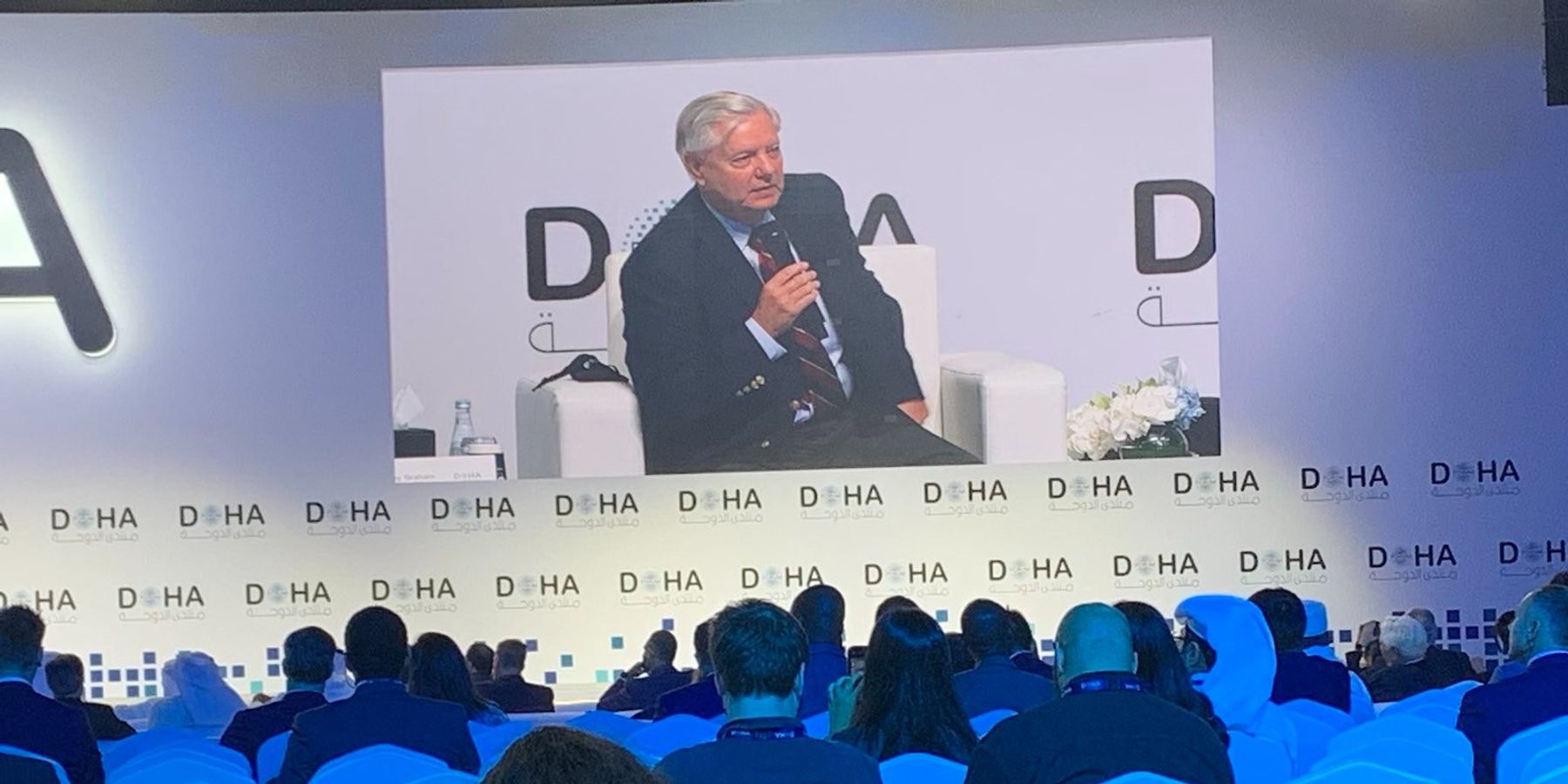Senator Lindsey Graham had two options walking into the Doha Forum in Qatar this weekend: find a way to triangulate his full-throated support for Netanyahu policies in Israel for the largely Palestinian-supportive Muslim audience Sunday, or wave his own flag without reservation. He went with the latter.
The South Carolina Republican made it clear he was no stranger to the region — he touted a long friendship with his host the Emir of Qatar and lauded the kingdom's role as international mediator and host to America's Fifth Fleet. But he didn't bat an eye to tell this audience — thousands of Muslims assembled from across the Gulf and the broader Middle East, plus attendees from Global South nations and Europe — that the U.S. veto of the ceasefire was one of the few things he thought the Biden Administration got right.
"President Biden ...You have risen to the occasion after October the seventh," he said, addressing the audience Sunday. "I have a world of difference with President Biden on many things. But when he vetoed the ceasefire resolution, he did the right thing and let me tell you why. Every ceasefire Hamas has ever entered has been broken and we're not going to do a ceasefire until hostages begin to be released like promised and would give the Israeli military the time and space they need to make sure that Hamas ceases to be a threat to Israel and the Palestinian people."
"So as a Republican, I am standing behind President Biden's decision, (against) that resolution and the one that comes next." The audience, at all times polite, sat stone faced.
He also said the only way there will be peace in the Middle East will be to get Iran — the real culprit. And the only way to start building a state for Palestine ith the Israel-Saudi deal the icing on the cake.
"I pledge in front of the world to help President Biden secure the votes in the United States Senate to make it possible for Saudi Arabia to have a defense agreement with us, which would then make it possible for Saudi Arabia, to recognize Israel," he declared. "Before the world I pledge my support, to help reconstruct a new Palestine but none of this is possible until you have a less corrupt younger Palestinian Authority, replacing the one we have. And a Hamas can no longer wreak havoc on Israel, on their own people.”
That potential U.S.-brokered Israel-Saudi deal have been deemed all but dead after the Oct. 7 attacks in Israel. Graham contended that aside from hating Jews, Hamas launched the attacks to kill any hope for that deal to go forward. Observers have come to similar conclusions — that the so-called Abraham Accords had left the Palestinians on the cutting room floor, inciting anger among the militant elements in Gaza. But unlike Graham, these critics' hold that the agreements are the problem — that regional leaders' shouldn't have allowed Israel to shunt the peace process to the side in the first place.
Not only did Graham ignore this fatal flaw of the agreements, he reveled in his own blind spots, choosing to ignore any culpability of the Netanyahu government over the decades leading to the violence and what appears today, an endless bombardment and on-the-ground military operation in Gaza with chances for further talks between the two sides dwindling by the hour. Instead, he appeared to blame Iran for everything.
"The biggest fear of the Ayatollah is that the Arab world, in conjunction with Israel, marches toward the light away from the darkness. (Iran hates) the idea that everybody in this room can find a way to work with Israel and live with Israel where everybody makes money and can live in peace. Because let me tell you, their agenda is different than yours. So I believe we cannot let Iran win."
He said he was committed to a two-state solution, and if there was any moment in his talk where he put any responsibility on Israel it was this: "I'm going to Israel soon and here's what I'm telling Israeli friends — Saudi Arabia, Qatar, UAE, none of these Arab countries can help you. Unless you make a commitment for a two state solution. ...To my friends in Israel the best thing you can do to beat Iran is to give the Palestinians a life where they're not dependent upon terrorist organizations that they can live and work and be prosperous."
How Israelis could get there, from here, was not explained by Lindsey Graham, or whether he honestly thought that was possible given the "hell on earth" Gaza is becoming today. But we know he doesn't believe that the civilian crisis on the ground now will reduce the chances for peace tomorrow, because of the way he reacted to U.S. Defense Secretary Lloyd Austin's remarks earlier this month.
Austin said “the lesson is that you can only win in urban warfare by protecting civilians. In this kind of a fight, the center of gravity is the civilian population. And if you drive them into the arms of the enemy, you replace a tactical victory with a strategic defeat.”
To which Graham responded:
“Strategic defeat would be inflaming the Palestinians? They’re already inflamed,” Graham continued. “They’re taught from the time they’re born to hate the Jews and to kill them. They’re taught math: If you have 10 Jews and kill six, how many would you have left?”
- Sadly, Graham's call for Putin's assassination is not his craziest moment ›
- When Lindsey Graham's pro-life persona meets Gaza ›
- Is carnage in Gaza bringing Iran and Saudi Arabia closer? | Responsible Statecraft ›
- Blinken appears laser focused on a Saudi-Israel deal, at all costs | Responsible Statecraft ›
- Graham: Israel will ‘do in Gaza what we did in Tokyo and Berlin’ | Responsible Statecraft ›
















